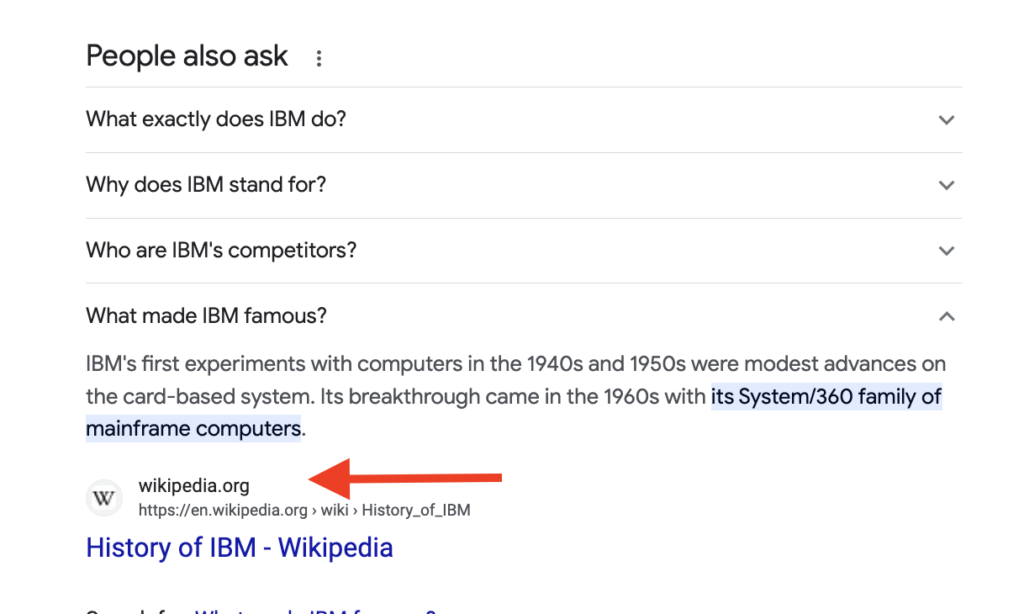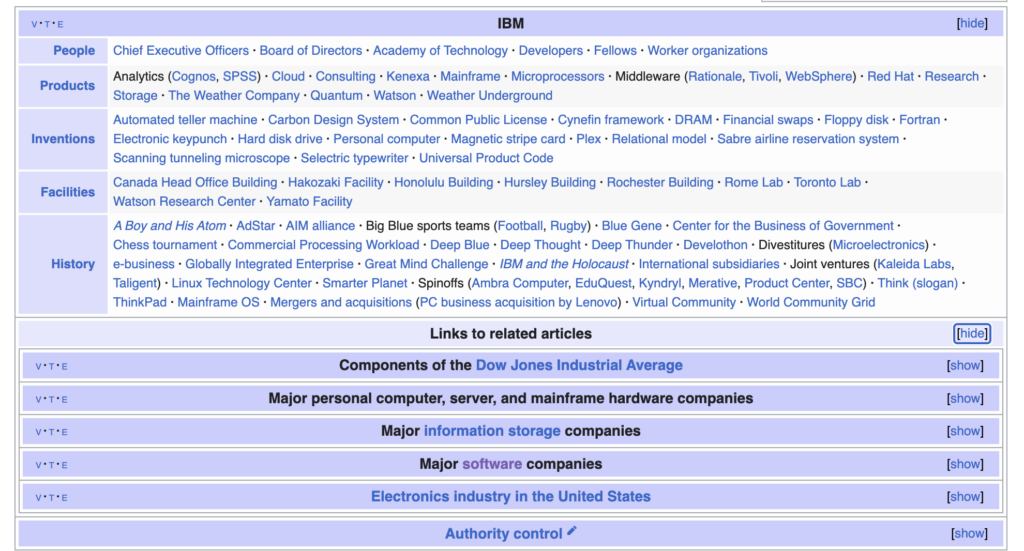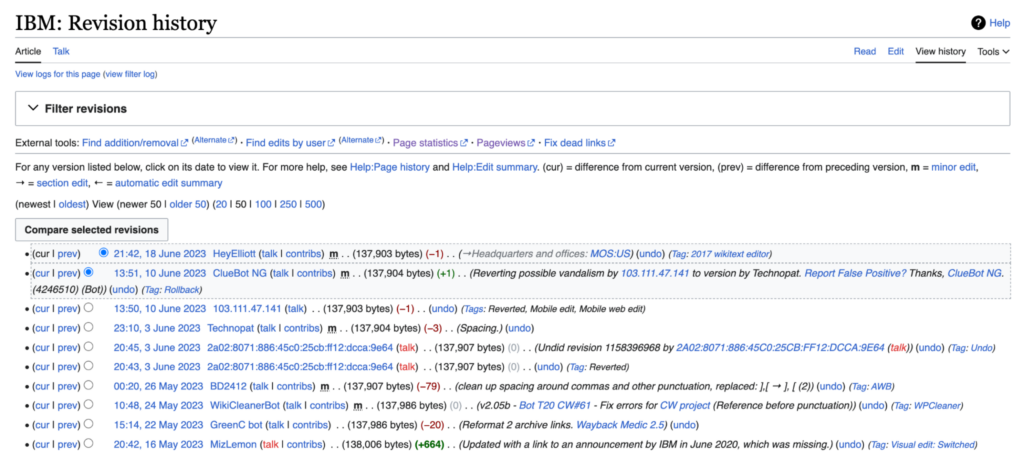SEO, search engine optimization, is affected by countless factors. These factors change over time and one that is currently having a high impact is Wikipedia. Why?
- This hugely important website almost always ranks in the top 3 results on Google, gets over 1 billion monthly visits in the U.S. alone, and populates most of the descriptions displayed in Google knowledge panels.
- Wikipedia is the number 2 source of information for ChatGPT, only behind Google Patents answering over double the queries than the third spot.
- On average voice bots like Siri, Alexa and Google, used Wikipedia to answer questions 99% of the time.
Its high visibility and domain authority make it an important SEO factor, in more ways than one.
If you want to grow your online presence, boost your domain authority, or build trust for your brand, your goals are going to be affected by your Wikipedia presence.
(Quick note: We gave a free LinkedIn training on this topic, if you’d rather listen than read.)
Table of Contents
Wikipedia Features

Here are the ways you could find yourself appearing on Wikipedia, and the ways each of these impacts SEO.
Wikipedia pages
Wikipedia pages can exist for your company, your top executives, and even possibly your lead products. These page entries might be only in the English language version of Wikipedia, or could exist across multiple language versions.
Because Wikipedia gets millions of views a day, Google recognizes that it is a site users want to see. Therefore, Wikipedia pages almost always appear as a top 3 search result for any person, place, or thing. This high visibility gets Wikipedia even more page views, perpetuating the cycle.
How does this impact your SEO? Well, if you have one or many Wikipedia pages, searchers are likely to see those pages front and center on Google. Then there’s the fact that Google sees these pages as so reliable and trustworthy, it pulls information from them for knowledge graphs and knowledge panels. That means there are multiple ways that Wikipedia information is visible on Google even if searchers don’t ever visit Wikipedia. In fact, Wikipedia appears in Google’s featured snippets 10 times more than any other website. How’s that for online presence?


Your thought leadership on relevant Wikipedia pages

Sometimes you will find your organization’s thought leadership on Wikipedia pages other than your company page. If you think about it, this makes sense. After all, there are millions of Wikipedia articles out there. There are going to be at least a few that are relevant to your brand.
This could be anything from a mention on a competitor’s page, to a sentence or two on a page relevant to your services and products. For example, do you work with patents or programming tools? Review those Wikipedia pages. You just might find that a Wikipedia editor has included something about your company or your thought leadership.
If you’re curious about this and need some help hunting down relevant articles, go to the bottom of your Wikipedia page, or a competitor’s, and look at the listed categories and related pages:


Just because a category is listed, does not mean that you will be on that page. But, it’s worth a check!
How does this help with SEO? It’s all about brand awareness. The more places you appear on Wikipedia, the more chances for someone to discover you. Also, when these pages appear in search results, your online visibility is boosted.
Your content used as sources on other pages

Wikipedia functions by using sources to verify content, so you might also see content you’ve created used as sources throughout the encyclopedia. All sources must be of good quality, factual, well-researched, and third-party, so the sources most likely to be used are white papers, peer-reviewed research studies, and university-level textbooks. Don’t go looking for press releases or interviews.
These sources appear as external links on Wikipedia. Their presence on a site with such a high domain authority helps to tell Google that they in turn are trustworthy and reliable. This can boost their (your) domain authority, which can result in boosted rankings on Google.
There’s also the chance that readers will click on these links looking for more information and learn more about your brand.
External links on relevant Wikipedia pages
There are some powerful recent studies that show the impact of links on Wikipedia for a brand:
- One recent study found that external links generate $7-13 million worth of monthly traffic to other sites
- A MOZ study of 647 search results reported that 89% of websites and organizations on the first page of Google had at least one Wikipedia mention
These external links can be sources, but the studies also looked at external links listed in infoboxes, like this:

As well as links that appear in the “External links” section at the bottom of a Wikipedia page:

Internal links on relevant Wikipedia pages
You can also have internal links on Wikipedia to your Wikipedia page. If we look at IBM’s page, we see a lot of blue hyperlinks. Each of these links to a Wikipedia page.

What do these Wikilinks do for your SEO?
They point back to your page which increases the authority of your Wikipedia page and drives more views. This will help the page to begin to rank higher for keywords on Google, which will lead to more traffic for your page and keep the cycle going.
Additionally, increasing the authority and views of your Wikipedia page will strengthen the authority of any external links to your website that are on your page.
Avoiding trouble: Wikipedia’s guidelines
After reading about all the ways that Wikipedia can boost your SEO, you might be thinking that there’s no point in waiting for other editors to add mentions of you here and there. It’s time for you to take the wheel and ensure your brand has the Wikipedia coverage it deserves.

Stop right there.
Wikipedia is free to edit, and welcomes edits from any person in the world, but it is not free to spam with promotional, marketing content. It is designed to be a compendium of (eventually) all the world’s knowledge, compiled by volunteers. It is NOT a sales platform, a promotional website, or a marketing service.
If you want to add anything to Wikipedia, you must follow these guidelines:
- COI and talk page: If you want new copy added to a page that is directly related to your brand (i.e. your company page, your product page, or an employee page), you are encouraged to not edit it directly. This is in order to keep articles neutral. Instead, you are asked to make your request on the talk page. When you do this, be sure to share your COI.

- Notable content: The subject of a page must be notable according to Wikipedia’s standards. This means it must be well covered in 5-10 third party sources. Interviews, press releases, promotional content, and anything from the subject’s website may NOT be used to establish notability. Before you draft any new pages, make sure the subject passes the notability test.
- Use reliable sources: This includes academic and peer-reviewed publications, university-level textbooks, mainstream newspapers, and other encyclopedias.
- Everything you add to Wikipedia must be verifiable.
- Write in a neutral point of view: Remember, Wikipedia is an encyclopedia.
- Avoid copyright infringement: Do not copy+paste text. Editors will not allow that in drafts, and any copyright violations in published pages will be quickly taken down by bots. This includes images.
- Focus on improving the quality of each page, not making yourself #1. (This can be counterintuitive, but this is how Wikipedia works.)
Wikipedia can really amplify your brand
Wikipedia’s SEO impact is nothing to be ignored. This one website offers a number of different avenues that can improve SEO and support better brand visibility overall. Whether you want to simply explore the website or dive in and help improve its breadth and depth of knowledge, just remember that it does not exist in a vacuum and that all edits are publicly recorded.


Now, have fun! As always, If you have any questions, we are only a call away.



